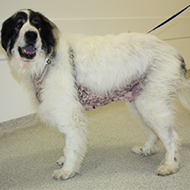
Change affects cortisol results from Siemens Immulite 2000.
The BSAVA has announced a change in the antibody used to test for cortisol.
In a press release, BSAVA said it has been working with the European Society of Veterinary Endocrinology (ESVE) which has become aware of a permanent change in the antibody used for the cortisol test for the Siemens Immulite 2000.
BSAVA said the change affects the antibody pool from kit Lot 550 onwards, meaning that it has already affected some laboratories and others will be affected in the coming weeks to months. It added that the new antibody lots are not being released to the USA market and other analysers are unaffected.
The announcement follows a review by the ESVE's Endocrine Quality Assurance (EQA) Scheme, suggesting that canine serum cortisol results are lower than diagnostic laboratories and clinicians have been used to in the past. The review also found that the effect is more marked in canine urine cortisol.
In light of this review, the manufacturer has formulated adjustment factors that laboratories can incorporate into their systems to reduce the impact on results. If the manufacturer adjustment is used, then the results will be around eight per cent lower on average in serum and around 60 per cent lower in the urine.
BSAVA said that cut-offs to diagnose hyperadrenocorticism and rule out hypoadrenocorticism may need to be validated again with the new assay. There is not yet sufficient data in the ESVE-EQA collaboration, however, to assess the impact on feline and equine samples.
Professor Ian Ramsey, BSAVA president and one of the founders of ESVE, explained: “Individual laboratories may have different ways of dealing with this change and therefore it is important to keep in touch with your laboratory provider concerning their approach.
“Some may choose to make the mathematical adjustments to results so that common and historic cut-off values can continue to be used. Others may report their results directly but change their guidance on interpretative cut-off values.”
Dr Peter Graham, ESVE-EQA co-ordinator, added: “ESVE advises that all cortisol results from Siemens Immulite 2000 assays that are close to a threshold are interpreted cautiously. ESVE also advises that all endocrine results should be interpreted in the light of clinical findings and would like to remind clinicians that spurious results may occur in any assay, though this is rare.”
Image (C) Professor Ian Ramsey.



 The latest
The latest